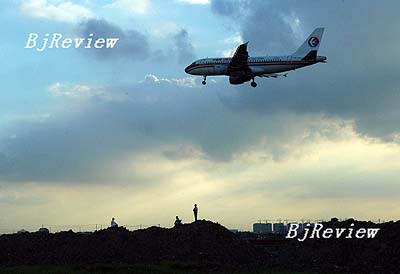|

Recently, international oil prices have been rising continuously. Crude oil futures prices traded in New York surged to $93 per barrel on October 29.
However, in China, oil prices are set by the government and not by the market. The recent hike on the price of oil in China is a measure implemented to narrow the gap between soaring global crude oil prices and domestic fuel prices. NDRC officials answered questions posed by Xinhua News Agency about recent oil price hikes. The questions and answers follow:
Xinhua News Agency: Could you please explain what led to this round of refined oil price hike?
NDRC: The adjustment mainly results from the rise in international oil prices. Early last year, the State Council set up a basic goal of refined oil price reform, which was to allow the oil price to float within a rational range based on linking domestic refined oil prices to the prices in the international market.
Until the second quarter this year, domestic refined oil prices had remained unchanged. However, international oil prices escalated in March and soared substantially in the past two months. On September 13 and October 25, the crude oil price exceeded $80 and $90 per barrel, respectively, and it further rose to $93.53 per barrel on October 29. The current price is $30 more than earlier this year.
Half of the country's crude oil is imported. The higher international oil price made the domestic disparity between the purchase price and sale price even sharper.
If one barrel of crude oil is $80, refineries will lose 1,000 yuan per ton. If one barrel is $90, the loss will be much larger. The heavy losses forced some refineries to stop production or keep half-production, which caused serious shortages of refined oil in the market.
Raising the refined oil price will encourage refineries to resume production and guarantee market supply. It is also an urgent measure to help carry on price reform and encourage energy conservation.
What are the major changes in this round of price adjustments?
Taking into consideration international oil price rises and the nation's ability to endure the price change, the benchmark retail prices of gasoline and diesel oil were raised to 5,980 yuan and 5,520 yuan from 5,480 yuan and 5,020 yuan per ton, respectively. On that basis, retail costs will increase 8 percent, meaning that drivers will have to pay 0.4 to 0.46 yuan more per liter of gasoline or diesel. The producer price of liquefied gas has also been lifted to some extent.
Domestic natural gas prices are too low compared with international standards, thus giving rise to a serious supply and demand problem. In order to curb the excessive natural gas demand from industrial projects and the blind development of replacing oil with gas in the auto industry, the NDRC decided to raise the natural gas producer price for industrial use (excluding the fertilizer industry) and for motor vehicles.
The refined oil price adjustment took effect on November 1, and the price adjustment of natural gas will be adopted soon.
The transportation industry will be affected seriously by the price hike. What will the government do to relieve the cost burden on this industry?
| 